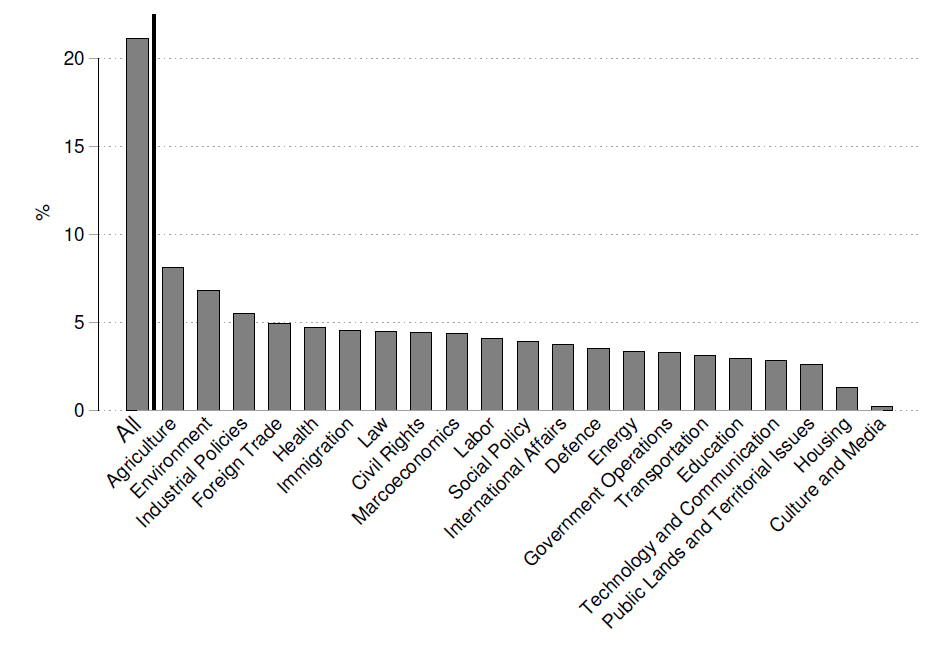Domestic and European parliamentarians of the same party tend to pay attention to the same policy issues
Do members of the European Parliament (MEPs) act remote from their national party or do they coordinate their behaviour with their ‘home base’? Using data on written parliamentary questions from Danish MPs and Danish MEPs, Roman Senninger and Daniel Bischof show that issue attention across the national and European levels converges, especially within parties represented at both parliamentary levels.
Most EU member states apply electoral rules where national parties have a strong say about who will be listed as candidate for the European Parliament election. Hence, every five years national parties have to make up their mind about who qualifies best for representing the party at the European level. In this process, parties have an incentive to choose their candidates carefully, since they have little leverage to control ‘their’ MEPs during the parliamentary term. Furthermore, recent research has shown that domestic parties which seek to influence the voting behaviour of their MEPs lose out to the European party group in most cases.
Strong ties between national parties and MEPs?
MEPs however do not spend all their time in Strasbourg and Brussels, but also in their home countries and constituencies. Moreover, national party offices seem to always have an open door for their MEPs. For example, MEPs regularly participate in party committee meetings; they are involved in the drafting of election manifestos and are consulted during national election campaigns to deal with European Union issues. But how does contact between national parties and individual European representatives actually effect legislators’ behaviour in the European parliament?
We argue that the contact between domestic parties and MEPs offers opportunities to exchange information about policy strategies. Domestic politicians and MEPs talk about issues that are important to the national party; hence issues that should be prioritized by all party officials. This exchange of information is then likely to be reflected in the issues MPs and MEPs raise in their day-to-day business in each of their political settings. In particular, we assume that representatives affiliated to the same party focus on very similar issues in the same time period. In order to test our assumption about issue convergence across levels, we conduct logistic and multilevel regression models using pairs of parliamentary questions from political parties in the same month as our unit of analysis.
MPs and MEPs affiliated to the same party pull together
Our results show that representatives at the national and the European levels do care about the same issues at the same time. Thus issues addressed by domestic MPs and MEPs converge. More than 21 per cent of all cases included in the analysis (all possible dyads of written questions across parliamentary levels in the same month) address the same policy issue (see Fig.1). Clearly, the level of issue convergence varies across policy area. We find that issue convergence particularly occurs in policy areas where the European Union has extensive decision-making powers, such as agriculture and industrial policies.
In addition, the results of our analysis reveal that issue convergence is very likely to occur within the same party. This means that MPs and MEPs affiliated to the same party are likely to address the same policy issue in the same month, e.g. MPs and MEPs affiliated to the Social Democrats are more likely to ask one or more questions on labour issues at the same time. It is the representatives affiliated to one of the three biggest parties in the Danish parliament (i.e. the Social Democrats, the Liberals and the Danish People’s party) which are most likely to address the same issue in the European Parliament as their national party at the same point in time.
Conclusion
Members of domestic parliaments and members of the European parliament work remotely from each other and are seldom mentioned in the same breath. However, they have a lot in common. They are both affiliated to national parties and use similar instruments in their legislative work (e.g. parliamentary questions). In our paper we have considered the question of whether they also focus on the same policy issues. Indeed, we demonstrate that the issues addressed in written parliamentary questions converge across the domestic and European parliamentary level. Issue convergence is most likely if representatives are affiliated to the same national party. We suggest that close informal ties between national parties and their MEPs explain why they focus on the same issues. Hence parties strategically make use of parliamentary questions across levels to influence the parliamentary agenda. In doing so they might compensate for their loss of influence on their MEPs’ voting decisions in the European Parliament.
—
Note: This post is a summary of a working paper that was presented at the 5th annual general conference of the European Political Science Association (EPSA) and will also be presented at the annual Elections, Public Opinion and Parties (EPOP) conference. The title of the working paper is “Asking Questions in Complex Multi-Level Systems: Bringing the Party Back In”. It represents the views of the authors, and not those of Democratic Audit or the LSE. Please read our comments policy before posting.
—
Roman Senninger is a PhD student in Comparative Politics at the Department of Political Science at Aarhus University (DK). His research examines how political parties approach European Union issues. He is especially interested in political parties’ control activities in European Union affairs. He graduated in political science from the University of Vienna in 2014.
 Daniel Bischof is currently a PhD candidate in Comparative Politics within Prof. Laura Morales’ ResponsiveGov project at the University of Leicester (UK). Starting in September he is going to be a Postdoc at the University of Zurich (CH). His research is particularly interested in political parties, especially responsiveness of political parties to protest and public opinion, the impact of repression on collective action, and quantitative methods. He graduated in political science from the University of Bamberg in 2012.
Daniel Bischof is currently a PhD candidate in Comparative Politics within Prof. Laura Morales’ ResponsiveGov project at the University of Leicester (UK). Starting in September he is going to be a Postdoc at the University of Zurich (CH). His research is particularly interested in political parties, especially responsiveness of political parties to protest and public opinion, the impact of repression on collective action, and quantitative methods. He graduated in political science from the University of Bamberg in 2012.








 Democratic Audit's core funding is provided by the Joseph Rowntree Charitable Trust. Additional funding is provided by the London School of Economics.
Democratic Audit's core funding is provided by the Joseph Rowntree Charitable Trust. Additional funding is provided by the London School of Economics.
Domestic and European parliamentarians of the same party tend to pay attention to the same policy issues: https://t.co/ZeroCKGQz8
Domestic and European parliamentarians affiliated to the same national party raise attention to the same policy is… https://t.co/BxwBcGGaGz
Domestic and European parliamentarians of the same party tend to pay attention to the same policy issues: Do m… https://t.co/99NX79JkZu
[…] Find the link here. […]
Do domestic and European parliamentarians of the same party tend to pay attention to the same policy issues? https://t.co/AkiH31m1T6
Domestic and European parliamentarians of the same party tend to pay attention to the same policy issues https://t.co/C8JpqWP4Pm
Domestic & MEP parliamentarians in same national party raise same policy issues in their non-legislative behaviour https://t.co/BaEUd59eS6
New contribution to the LSE democratic audit: issue convergence across institutional levels. https://t.co/iw9EZ9R045
Domestic and European parliamentarians affiliated to the same national party raise attention… https://t.co/I9UZovDyjk https://t.co/hK7cob0UCQ
“@democraticaudit: (Danish) MPs and MEPs affiliated to the same national party raise attention https://t.co/Q2RPC2VxlJ” interesting research